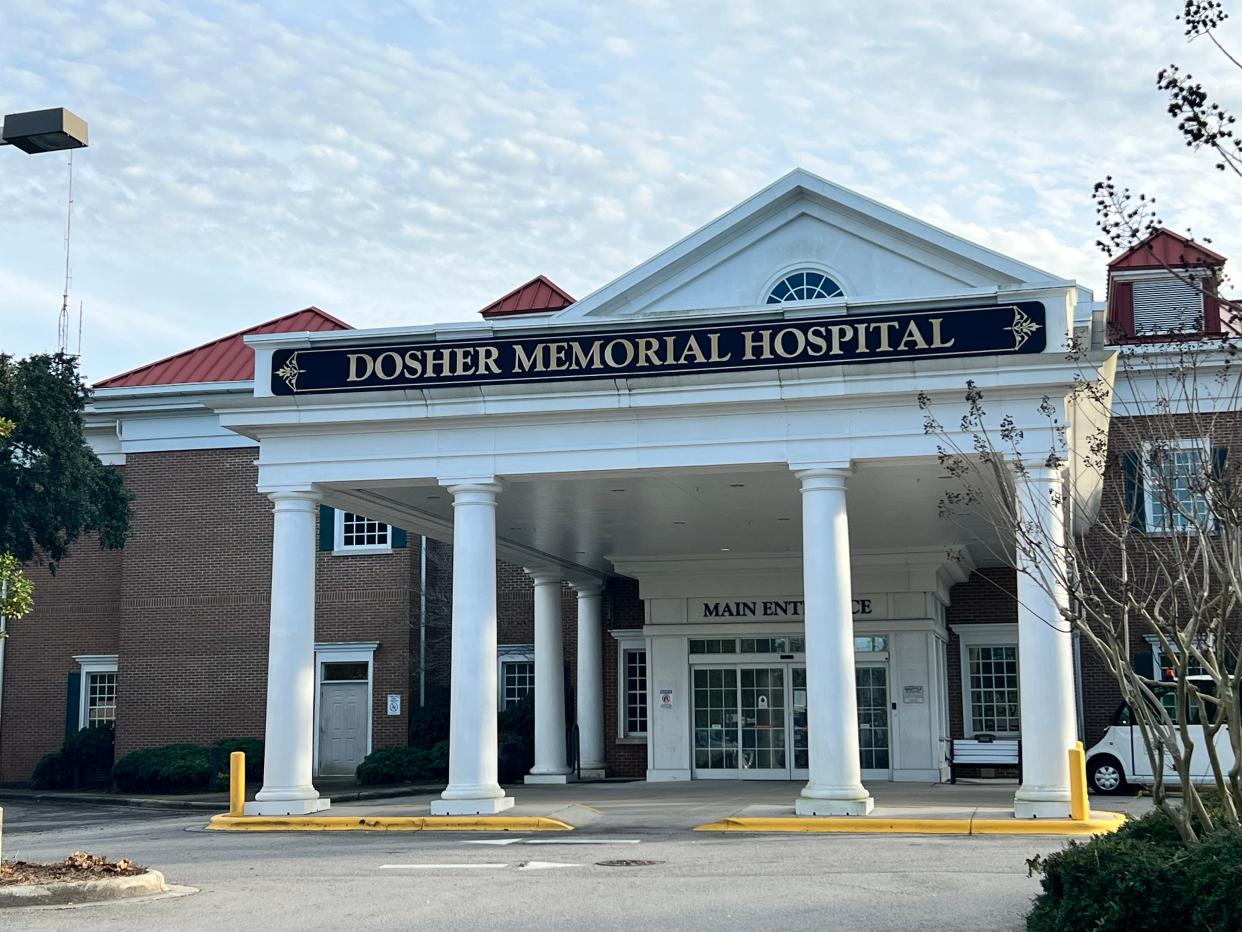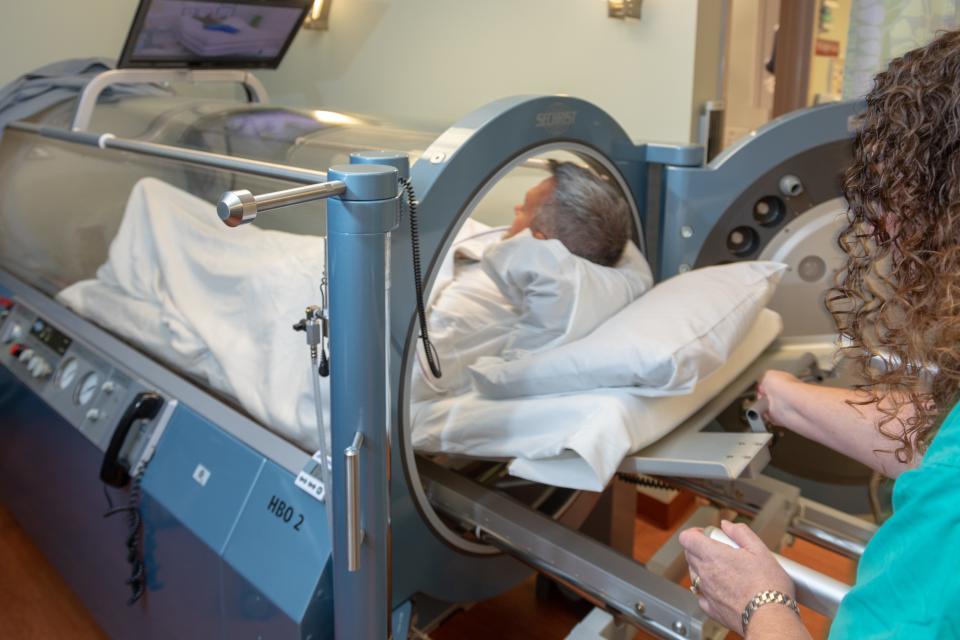A 47-year-old Brunswick tax could go away. How that could land a hospital on life support.

When it comes to J. Arthur Dosher Memorial Hospital, the Oak Island Town Council says, “No bond, no tax.”
During its last regular meeting on Thursday, Sept. 7, the Oak Island Town Council voted to send a resolution to the Brunswick County Commissioners asking them to rescind the Dosher Hospital tax for all property owners in Smithville Township.
But forwarding that resolution to the Brunswick County Commissioners is just the first step in the process.
According to North Carolina General Statutes, repealing the tax, which has been in place since 1976, will require a referendum. Here’s a look at the history of the tax, why some want to see it rescinded, and what that could mean for the hospital.
History of the tax
Residents in the area have supported Dosher Hospital since efforts began to establish a public hospital in the 1920s. Half of the $30,000 needed for the facility was funded through a grant from James B. Duke Endowment. The Brunswick County Board of Commissioners provided $7,500, and residents in the city of Southport overwhelmingly approved a bond referendum, covering the remaining $7,500. Construction of the hospital began in 1929, and it opened in June 1930.
In 1976, residents in Smithville Township — one of Brunswick County’s six townships, which includes Bald Head Island, Caswell Beach, Oak Island — voted to levy a tax of 4 cents per $100 of assessed value for 25 years to support bonds for Dosher Memorial Hospital. In 2000, Smithville Township voters approved a measure extending the tax for 30 years through 2030.
In 2007, Brunswick County and the Dosher Memorial Hospital Board of Trustees agreed to reduce the tax from 2.25 cents per $100 of assessed value, but that agreement was canceled in 2012, and the tax went back to 4 cents per $100 of assessed value, where it remains today.
Why rescind it now?
During the Oak Island Town Council’s regular meeting on Sept. 7, Councilor Mark Martin introduced the resolution asking Brunswick County commissioners to rescind the tax, noting it had been “an ongoing topic” in the community for many years.
Martin said the recent property revaluations, which resulted in significant increases to the home values in several areas including Oak Island, brought the issue to the forefront.
“We were, in my opinion, hit very hard with significant tax value increases on our properties,” he said.
Martin said while the Brunswick County Board of Commissioners and the Oak Island Town Council adopted revenue-neutral tax rates, the Dosher Hospital tax remained the same 4 cents per $100 of valuation.
“I don’t know about everybody else’s property, but collectively, on my property, my taxes ended up going up this year purely because the Dosher Hospital tax did not move off of their rate,” he said.
Martin encouraged the council to adopt the resolution and said he would like to see other municipalities “come on board,” and pass similar resolutions.
“I say it’s time we take a stand and adopt this resolution to show the county that we’re done,” Martin said.
Mayor Pro Tempore John Bach said while he agreed with Martin, he did have concerns about pulling the funding.
“I do want to send a message to the county commissioners,” Bach said. “I get that, but I don’t want to have catastrophic collateral damage because if the revenue were to be pulled from Dosher without a plan to sustain the hospital, there could be considerable damage.”
He added the town has some Dosher medical facilities in its limits.
Martin pointed out Novant Health now operates clinics in the area, including Novant Health Family Medicine Pine Forest, which is within Oak Island’s town limits.
“Why aren’t we having a conversation about adding a tax for Novant Health?” he asked.
Martin said both Dosher and Novant operate under 501c3 status as healthcare providers, and if taxes were a means of support, there should be a broader discussion about supporting healthcare facilities through taxation.
“I think if you sat down and said to anyone, ‘Well, we need to pay a Novant Health tax,’ they’re gonna say, ‘No,’” Martin said. “So, that’s why I’m saying we don’t need to pay a Dosher Hospital tax either. The bond’s going to be satisfied. No bond, no tax. That’s my message for tonight, and I would appreciate everyone’s support.”
Councilman Bill Craft said while he appreciated and respected Dosher Hospital, he agreed with Martin.
“Our job is to protect the interests of the people of Oak Island, and we’ve been hit by mean tax bills lately,” Craft said.
The resolution passed unanimously with one council member, Sheila Bell, absent.

Impact on Dosher
According to Ilene Evans, spokeswoman for J. Arthur Dosher Memorial Hospital, the hospital received $2,545,811, or three percent of its revenue, from the tax in 2023. In 2024, that amount is expected to be more than $4.1 million, or 6 percent of the total revenue, due to the bond being paid off.
“Dosher is able to fund the operating costs for the hospital, however because of our size and limited revenue sources, we are unable to generate sufficient revenues necessary to provide for capital maintenance, upkeep, or replacements for major equipment and facilities,” Evans said in an email.
She also noted the ad valorem tax revenue can only be used on capital expenses and maintenance. It cannot be used on operating expenses, such as payroll.
“However, our ability to utilize the tax proceeds to make necessary capital improvements and expansions enables us to apply hospital revenue to building diverse service lines, hire quality staff, and invest in cutting edge medical technology,” she said.
Currently, the hospital is undergoing renovations, which include building a larger emergency department to meet the needs of the area’s growing population.
“In the Dosher Memorial Hospital Community Health Improvement Plan for 2023-2025, access to care was the number one priority, which came directly from the Community Health Needs Assessment surveys done last year,” Evans said. “Given the critical need for primary care providers and the projected growth in this area, the implementation of the Master Facility Plan and continued growth is critical.”
According to Evans, Oak Island officials did not reach out to Dosher Hospital about the tax prior to the council passing the resolution, and she said the hospital was not aware of any other towns considering similar measures.
Other municipalities weigh in
The StarNews reached out to representatives at the city of Southport, the village of Bald Head Island, and the town of Caswell Beach to see if any of those municipalities are considering resolutions similar to the one passed by the Oak Island Town Council.
Joe Pierce, town manager for Caswell Beach, said the issue has not come before the town’s board.
“We’ve not discussed it, and I’m not sure it would even be under consideration,” he said.
Dorothy Dutton, assistant city manager for Southport, said it’s also not been a topic among Southport’s aldermen, noting she’s “not sure they would even consider it,” and “Southport is the home of Dosher.”
Carin Faulkner, spokeswoman for the village of Bald Head Island, said the village council briefly discussed the issue during its Sept. 15 regular meeting and there was a consensus not to weigh in on the matter. She added that Mayor Peter Quinn said he would follow up with Oak Island Mayor Liz White to see if there are any specific concerns the village does not know about.
Next steps
According to Megan Kascsak, spokeswoman for Brunswick County, the Brunswick County Commissioners are expected to consider the issue at a future meeting.
“The county will review the recent resolution and consider its options, but Brunswick County Government did not establish this tax,” Kascsak said in an email. “This tax was approved by the voters of the Smithville Township, which is an electoral district comprised of voters in specific area of the county. The Brunswick County Board of Commissioners cannot majority vote overturn a tax established by the voters.”
North Carolina General Statute 131E-46 states the board of commissioners the right to call a referendum repealing the tax when there are no outstanding general obligation bonds of the district. If a majority of voters are in favor of the rescinding the tax, the board of commissioners would no longer have the authority to levy the tax beginning in the fiscal year following the referendum.
Sara LaVere, director of the Brunswick County Board of Elections, confirmed the deadline to add a referendum to the November ballot has passed, but she said the referendum could possibly be added to the ballots for the primary election in March 2024. The deadline for changes to that ballot is Dec. 15.
STAY CONNECTED: Keep up with the area’s latest Brunswick County news by signing up for the Brunswick Today newsletter and following us on Facebook and Instagram.
This article originally appeared on Wilmington StarNews: Oak Island wants to end Dosher Hospital tax

